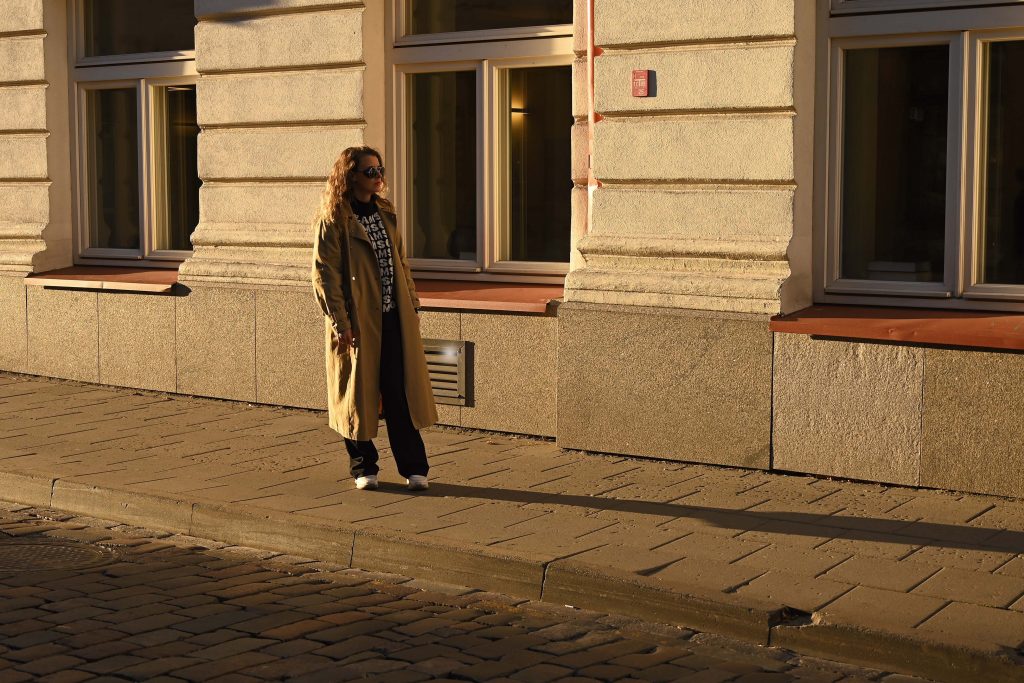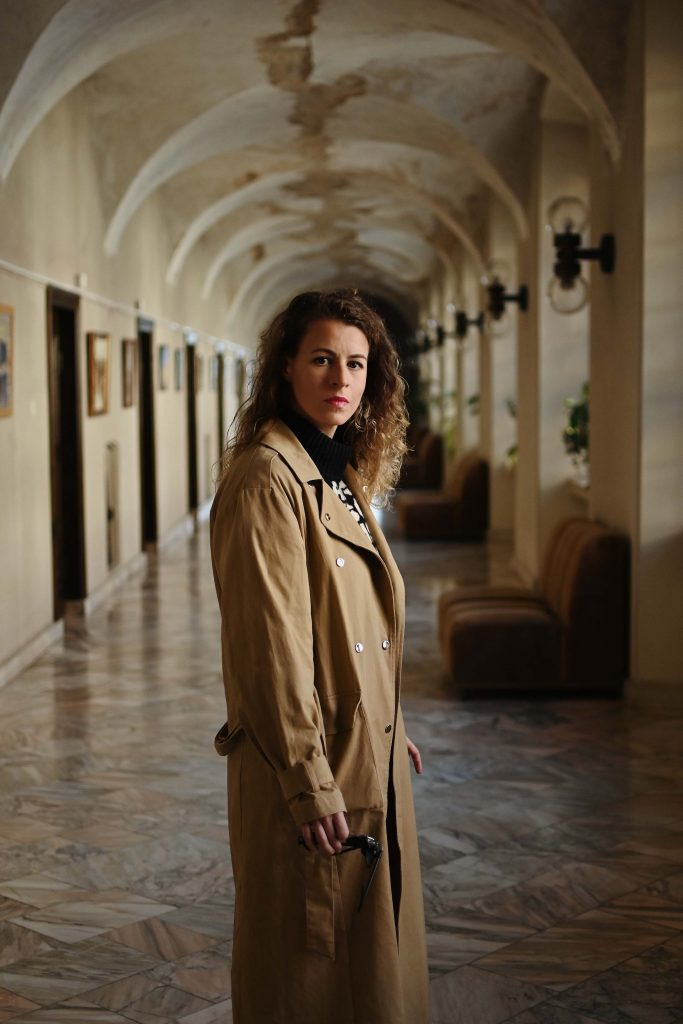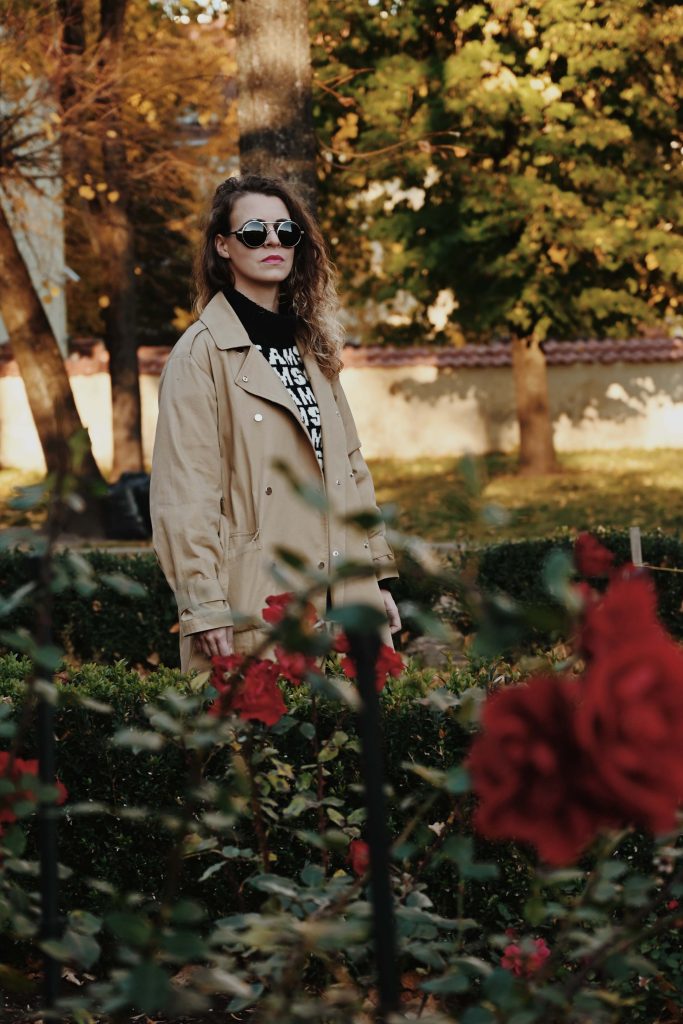My Vilnius introduces you to people for whom the city has become the place they call home. It’s all about the ordinary lives of extraordinary people and vice versa. These stories cover their favourite hidden gems and sights, as well as detours and discoveries in life.
Seemingly living at a speed of light, Akvilė Kavaliauskaitė is not only known for her captivating words. She’s also a well-seasoned journalist, teacher and screenwriter, among other things. In our conversation, we go through episodes of her life, including growing up in a small town, discovering her path and settling down in Vilnius.
VP: Tell us a bit about yourself—how did it all start?
Akvilė: I grew up in Ukmergė, a small town just 70 km from Vilnius, on the fifth floor of a Soviet apartment building. In our yard, children played basketball, fought and sniffed glue. I spent my entire early childhood playing the cello at a music school. I was successful at it and enjoyed playing—I thought I would become a musician.
Later, I moved away from music and became interested in contemporary dance. We travelled a lot in Lithuania with the local troup. This part kind of matured and brought me up. I became rooted in my hometown, and in its atmosphere. I got to know a lot of artists and local weirdos who told me incredible stories.
VP: Have you always known that you wanted to become a writer?
Akvilė: When I was eight, I started writing my first novel in school notebooks, inspired by soap operas played on TV at the time. Afterwards, I noticed that most of my classmates felt stressed when it came to writing something.
While for me—on the contrary—it was like actualising myself. I thought through everything in advance, wrote a draft, and then rewrote it. I liked the feeling when I reached the desired sound in a text or used a more thought-provoking idea.
One summer, when I was maybe sixteen, I got a job as an assistant at a sewing shop. The noise, the dust, the murmur of the tailors, the commute to work by bus, which started very early in the morning even before six—all this experience overwhelmed me so much that I began to think, “What am I knowledgeable about today?” and “How to make money while experiencing at least a little less pain?.”
So, I went to the local newspaper and asked if they needed any articles. At first, the editor-in-chief was surprised. But when I brought the first text, it was well-received by her. That’s how I made my first money from writing.
Soon enough, I realized that making money from writing wasn’t difficult for me. Don’t get me wrong, I’m not saying it’s easy. But I say that it’s easier than earning income from anything else.

VP: Can you share with us what the creative process of writing your book „Kūnai“ was like?
Akvilė: Five years had passed since my first book came out. They were all spent as if I was looking for what I was interested in and what might engage my readers. Not from the marketing side, but from the human side.
During that time, many different ideas and feelings accumulated, which turned into short novels. The year I wrote „Kūnai” (En.: Bodies) was intense since I travelled a lot for other jobs. So, I wrote texts on planes and trains, in Ukmergė, Chicago, and Spain—wherever I travelled. I wrote considerable pieces of text just on the phone.
When I got stuck, I went to places I hadn’t been before. I interacted with people and kept hearing something new as if I magically kept on finding the needed answer. I polished the texts for a long time—I wanted to be sure that I had written what I wanted and how I wanted it to sound so that I would read that which was of true interest to me. But in essence, the process was easy and uplifting. I felt happy writing that book.
VP: How did it feel to win a prestigious award?
Akvilė: Every time I hear this question, I keep rethinking it and giving a different answer. Now that some time has passed, I think the joy that came to me was not the award itself, but the thought that someone had read my texts and they found them important.
VP: What was the most memorable letter that you’ve received from a reader?
Akvilė: A young director wrote that she would like to screen one of the novels. I was glad that my stories encouraged another person’s creativity, and inspired new works. At the same time, it got the chance to be spread more widely among people who may not read books because they prefer cinema.
VP: What inspires you to write?
Akvilė: People and their pain. When I meet a stranger (this happens often because I also work as a journalist), I keep discovering new angles that hurt people and want to reflect on them more broadly.
VP: Who’s your most admired writer?
Akvilė: As a teenager, I read John Irving’s book “The World According to Garp” and thought I would write like him. Saramago’s “Blindness” impresses me with the purity of its form. Alfonsas Andriuškevičius manages to tell the whole essence of life by writing a short episode on how the hero takes a walk through the rain.
VP: What’s your relationship like with Vilnius?
Akvilė: Vilnius is not my hometown, but I quickly became a part of it. Probably because, as a journalism student, I started working intensively. There was a lot of travelling, talking, and discovering.
I am not inclined to compare Vilnius with other European cities. And I tell foreign friends that all places need to be felt first—to wander aimlessly throughout the streets on your own, to stop where it spikes your curiosity, to read on a bench in a park, to work at a café, or visit a small movie theatre. Then you stop being a tourist in the city and become part of the ecosystem.
VP: Do you have a place in town other than home, where you love to work and write from?
Akvilė: I rarely write in cafés. Only when I feel bored with the routine atmosphere in my own home, and when I feel like every day is the same. I prefer to walk and think.
Or sit down to lunch alone and listen to strangers’ conversations, watch the restaurant staff interact with each other. I also like going to an exhibition, and turning the works of art into text in my mind.
VP: How would you describe Vilnius to someone who has never been here?
Akvilė: That it is a city made up of a great number of historical layers. Vilnius is like an experimental cake, in which both salty and sweet flavours overlap, but in the end—everything fits together.
VP: Where can we find you in the digital sphere?
Akvilė: Feel free to follow my daily chronicles either on Instagram or on Facebook.








